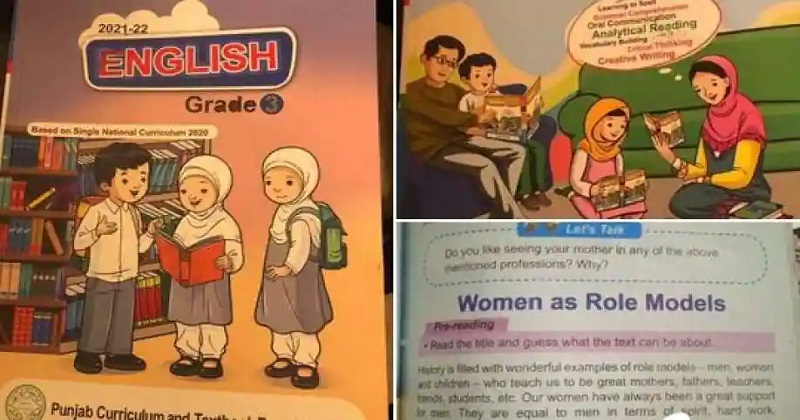
Pakistani Prime Minister Imran Khan unveiled the country’s unified national curriculum last month, saying it was the first step towards the emancipation of people from slavery. He lamented that individuals had absorbed the English culture, as well as English as a medium for higher education in his country. Many people have reacted negatively to the revamped Single National Curriculum (SNC), which is known as a ‘milestone’ in the country’s education system. The book has caused people to protest on social media, citing what they see as Oppressive gender standards.
There is a picture in one of these textbooks that shows a father and son reading a book on a couch, dressed in western clothes. At the first glance, the image of a hijab-wearing mother and daughter on the ground with a stack of books appears harmless. Many Pakistanis, however, perceive it as a sign of male privilege and feminine oppression. Education professionals, activists and members of the public have criticized the new curriculum for failing to encourage and incorporate gender equality, religious diversity and cultural unity.

Women Action Forum believes the SNC is ‘focused on ideological imperatives rather than pedagogical imperatives’ and ‘would sow the society with seeds of divided thinking’. In Pakistani textbooks, mothers, daughters, wives, and instructors are the most common roles for women. They are not involved in recreational or exercise activities. In the photos, only boys are depicted playing and exercising, while women are only shown as spectators. In the textbooks, young girls and women wearing hijab and headscarves were also pictured, drawing criticism.
Read more: The AK-203 project: Russia says it will train Indian specialists
Pakistani women wear the hijab on a regular basis, but it is not a native tradition of the country, but rather a coopted import from Gulf nations. As well as the capital city of Islamabad, the provinces of Khyber Pakhtunkhwa and Punjab have adopted the curriculum. Sindh’s southeastern region, where 7.5 million students attend schools and madrassas, rejected the proposal. Pakistani parents caught in the crossfire of the curriculum are also divided, trying to reconcile gender depictions in textbooks.

Post Your Comments